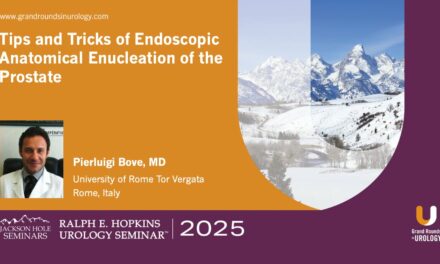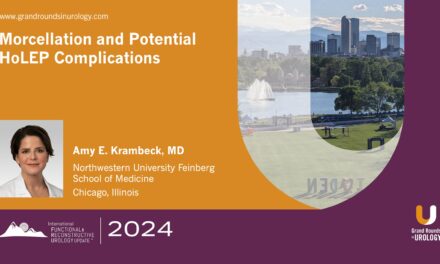Brian T. Helfand, MD, PhD, presented “Focal Therapies for Prostate Cancer: Recurrent versus Persistent Disease Management” during the 35th International Prostate Cancer Update conference on February 9, 2025, in Vail, Colorado.
This content is available free to the GRU Community. Login or create an account to view it.
How to cite: Helfand, Brian T. “Focal Therapies for Prostate Cancer: Recurrent versus Persistent Disease Management.” February 9, 2025. Accessed Nov 2025. https://grandroundsinurology.com/focal-therapies-for-prostate-cancer-recurrent-versus-persistent-disease-management/
Focal Therapies for Prostate Cancer: Recurrent versus Persistent Disease Management – Summary
Brian T. Helfand, MD, PhD, NorthShore University Health System, Evanston, Illinois, discusses focal therapy in prostate cancer management. In this 11-minute presentation, Dr. Helfand emphasizes its potential and challenges.
Dr. Helfand explains that prostate cancer is often multifocal, yet most cases have a dominant index lesion that drives metastasis and mortality. Focal therapy targets this index lesion while aiming to minimize damage to surrounding tissues. He acknowledges the balance between treating enough tissue to prevent recurrence and limiting treatment to avoid side effects.
Focal therapy, particularly in intermediate-risk disease, may extend active surveillance or delay more aggressive treatments. Dr. Helfand emphasizes that recurrence patterns—whether within or outside the treated field—should guide retreatment decisions, which may involve repeat focal therapy or radical interventions. He underscores the importance of considering comorbidities, life expectancy, and patient preferences when determining retreatment strategies.
About the 35th International Prostate Cancer Update:
The International Prostate Cancer Update (IPCU), is a multi-day, CME-accredited conference focused on new developments in prostate cancer treatment, diagnosis, and prevention. IPCU 35 will feature lectures, interactive discussions, panel roundtables, debates, and case reports. This conference is led by expert physicians and is designed for urologists, medical oncologists, radiation oncologists, and other healthcare professionals involved in the diagnosis and treatment of prostate cancer.
The goal of this educational program is to equip healthcare professionals involved in the diagnosis and treatment of prostate cancer with the up-to-date clinical knowledge and tools they need to best treat their patients. The program will discuss the treatment of prostate cancer from diagnosis to treating advanced and metastatic disease. The conference aims to give physicians exposure to a comprehensive review of treating prostate cancer patients and to give them a chance to discuss the issues with peers and experts. You can learn more about the conference here.
ABOUT THE AUTHOR
Brian T. Helfand, MD, PhD, is Chief of the Division of Urology and the Ronald L. Chez Family and Richard Melman Family Endowed Chair at NorthShore University HealthSystem. He is Director of the Personalized Prostate Program and Director of Clinical Research in the Program for Personalized Cancer Care (PPCC). He is also an active surgical scientist who is involved in the care of patients with prostate cancer. His clinical care and research is focused on the implementation of genetic tests and biomarker studies for prostate cancer.
Dr. Helfand completed his undergraduate degree at Emory University. He received his medical training and PhD in Cell and Molecular Biology and Genetics from Northwestern University. He is a fellowship-trained urologic oncologist who has focused his research career on prostate cancer. He was recruited in 2011 from Northwestern University’s Feinberg School of Medicine, where he was faculty in the Department of Urology. Dr. Helfand is an internationally-known urologist and genomic translational researcher. He has received multiple grants from the NIH and has published over 140 peer-reviewed manuscripts in journals such as Nature Genetics, The Journal of Cell Biology, and Science Translational Medicine.
Dr. Helfand is involved in national and international research collaborations as an active member of the International Consortium for Prostate Cancer Genetics (ICPCG), the Prostate Cancer Specialized Program of Research Excellence (SPORE), the IMPACT) study, and the Lower Urinary Tract Dysfunction Research Network (LURN). His current research goals are focused on germline genetic variations and mutations. He is determined to use this information to assist in personal and informed clinical decision making about prostate cancer screening and treatment for patients and their family members.




